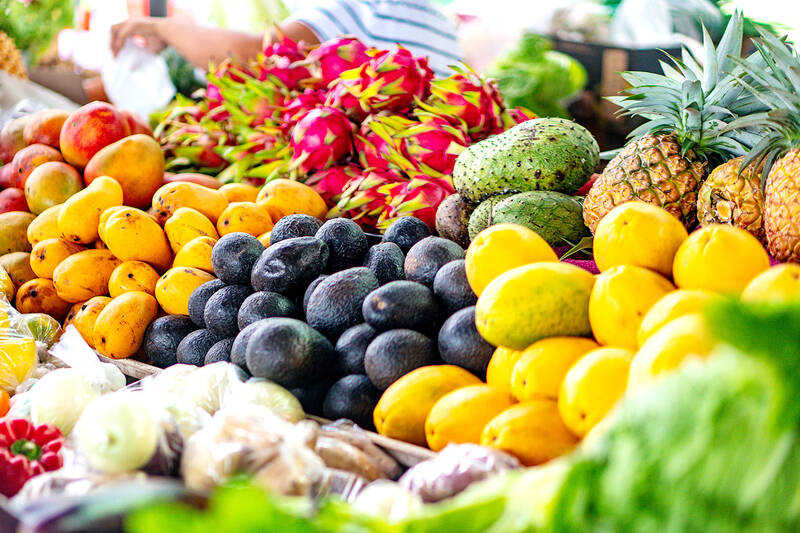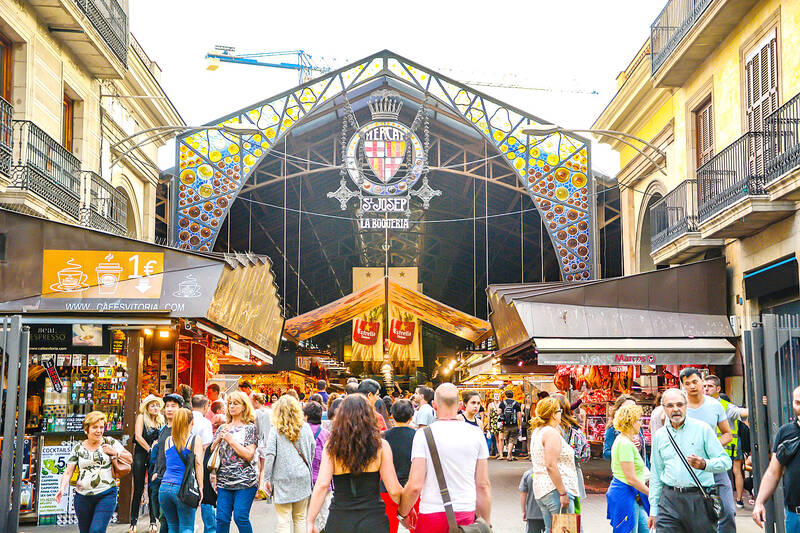There are many different kinds of markets in the world. In developed areas, people are most likely familiar with supermarkets or hypermarkets. In less developed rural areas, traditional markets are more common. These can be divided into two categories: dry markets and wet markets or fresh markets. Dry markets sell “dry” items, which are non-perishable goods such as clothing, crafts, kitchenware, toys or electronics. On the other hand, wet markets sell perishable goods, which are fresh foods like fish, meat, fruits and vegetables.
Though some of the oldest markets in history were wet markets, the actual term didn’t become common until the 1970s. The Singapore government coined the term to distinguish traditional markets from modern supermarkets. The word wet was chosen because ice and water are used to keep foods cool and fresh, making wet floors common at such markets.
Wet markets differ from supermarkets in a few significant ways, even though both may offer similar products. First, supermarkets offer more products beyond food items, such as household cleaning supplies, baby products, pet essentials, medicine and more. Second, supermarkets are operated by a single owner, so all sales go to one company. In contrast, the space of wet markets is divided into small stalls that are rented by individual vendors. Customers need to pay for items from each vendor separately. This also means that prices, the quality of products and standards of cleanliness can vary from vendor to vendor. A final difference is that the prices are not fixed, and sellers are open to bargaining at wet markets.

Photo: AdobeStock 照片:AdobeStock
These days, different kinds of markets are popular in different areas of the world. In some places, traditional outdoor, open-air markets are still very common. However, in urban areas, indoor wet markets located in giant metal or concrete structures are becoming the trend. Enclosed wet markets are usually considered more sanitary than outdoor wet markets.
世界上有許多不同種類的市場。在已開發地區,人們最有可能熟悉超市或大賣場。在較不發達的鄉村地區,傳統市場更為常見。這些市場可以被分為兩類:乾貨市場和菜市場(或稱新鮮市場)。乾貨市場販售「乾的」商品,這些是不易腐敗的物品,如衣物、手工藝品、廚房用具、玩具或電子產品。另一方面,菜市場販售易腐敗的商品,像是魚、肉、水果和蔬菜等新鮮食品。

Photo: AdobeStock 照片:AdobeStock
雖然歷史上有些最古老的市場是菜市場,但實際的術語直到 1970 年代才變得普遍。新加坡政府創造了這個詞,以區分傳統市場和現代超市。之所以選擇了「wet(溼)」這個字,是因為這些市場使用冰和水來保持食物的冰涼和新鮮,使得潮溼的地面在這類市場裡很常見。
菜巿場和超市在一些重要方面有顯著的不同,儘管兩者可能提供類似的產品。首先,超市提供了超出食品項目的更多產品,像是家居清潔用品、嬰兒商品、寵物必需品、藥物等。其次,超市由單一業主營運,因此所有銷售額都歸一家公司所有。相比之下,菜巿場的空間被分成供個別攤販租用的小攤位。顧客購買商品須個別付款給每個攤販。這也意味著價格、產品品質及衛生標準可能因各攤販而異。最後一個不同處是,在菜巿場裡,價格不是固定的,且賣家願意議價。
如今,在世界各地不同地區,各種不同類型的巿場都很受歡迎。在某些地方,傳統的戶外露天市場仍然非常普遍。然而,在城市地區,位於大型金屬或混凝土建築物內的室內菜巿場正在成為趨勢。封閉式菜巿場通常被認為比戶外菜巿場更加衛生。
Words in Use
1. developed a. 已開發的
Inflation is a problem that many developed countries face.
通貨膨脹是諸多已開發國家面臨的問題。
2. category n. 類別,種類
The boxer met all the requirements to fight in the heavyweight category.
那名拳擊手符合參加重量級比賽的所有條件。
3. craft n. 手工藝(品)
I’m planning to buy the craft supplies for our DIY project tomorrow.
我明天打算去買手工藝品的材料,以供我們的 DIY 項目使用。
4. electronics n. 電子產品(恆用複數)
People nowadays like to give electronics as Christmas gifts.
如今人們喜歡送電子產品作為聖誕禮物。
5. distinguish vt. 區別
distinguish A from B 區分∕分辨A與B
Most people can’t distinguish Kathy from Karen because they are twins.
大部分人都分不清凱西和凱倫,因為她們是雙胞胎。
6. household a. 家用的
The TV is a common household appliance.
電視機是一種常見的家電用品。
7. essential n. 必需品(常用複數)
Water, food and shelter are the essentials for survival.
水、食物和庇護所是生存的必需品。
8. operate vt. 經營,使營運
It is Sam’s dream to operate his own business someday.
山姆的夢想是將來有一天經營自己的事業。
9. separately adv. 個別地,分別地
The three brothers run their businesses separately.
這三兄弟各自經營自己的事業。
10. bargain vi. 討價還價
I bargained with the shop owner and saved NT$150.
我跟那家店的老闆殺價,省了新臺幣一百五十元。
11. urban a. 城市的,都市的
Older people often prefer a rural life to an urban one.
年長者常常偏好鄉村生活勝過城市生活。
Practical Phrases
1. be familiar with... 熟悉……
Ian is familiar with cooking Italian food.
伊恩對烹飪義大利料理相當熟悉。
2. be divided into... 被分為……
divide vt. 使分開;劃分
The 300-page book was divided into 10 chapters.
這本三百頁的書被分為十個章節。
3. differ from... 不同於……
Terry differs from his parents in many ways.
泰瑞與他父母在許多方面都不相同。
4. In contrast, S + V 相較之下,……
= By contrast, S + V
James doesn’t talk much. In contrast, his sister talks nonstop.
詹姆士話不多。相形之下,他姊姊卻講個不停。
5. vary from A to B 從 A 到 B 各異
The side effects of this drug vary from person to person.
該藥物的副作用因人而異。
6. be open to N/V-ing
對……持開放的態度,樂於接受……
I’m open to any suggestions that you may have.
我樂於接受你的任何建議。
To be continued tomorrow(明日待續)
https://www.taipeitimes.com/News/lang
聽文章朗讀及講解: https://ivy.pse.is/455bfu
本文出自常春藤解析英語雜誌: www.ivy.com.tw

A: When is the Lantern Festival? B: The festival is celebrated on the 15th day of the first month of the lunar calendar, which fell on Feb. 12 this year. A: Oh no! Did I miss the 2025 Taipei Lantern Festival? B: Yes, you did. But you can still go to the 2025 Taiwan Lantern Festival in Taoyuan, which will run until this Sunday. A: Let’s go admire the exuberant lanterns. A: 元宵節到底是哪一天? B: 就是農曆1月15日啊,今年則落在國曆2月12日。 A: 喔不,我是不是錯過了2025台北燈節? B: 是的,但你還可以去桃園的2025台灣燈會,活動將持續至週日。 A: 那我們去欣賞豐富的花燈秀吧! (By Eddy Chang, Taipei Times/台北時報張聖恩)

A: What’s the theme of the 2025 Taiwan Lantern Festival’s main lantern? B: The theme is “Paradise,” and the main lantern is a snake-shaped “infinity” symbol that features a lighting show every half an hour. A: Cool, I heard that there are over 300 lanterns. B: There are even giant lanterns in the shape of Pikachu and some other popular Pokemon characters. A: Let’s go now. A: 2025台灣燈會主燈的主題是什麼? B: 主題是「無限樂園」!主燈的造型則是蛇形的數學「無限號」,主燈每半小時還有一次燈光秀。 A: 酷喔,聽說總共有300多件花燈作品。 B: 甚至還有皮卡丘和其他熱門寶可夢角色的巨型花燈呢。 A: 哇我們現在就出發吧! (By Eddy Chang, Taipei Times/台北時報張聖恩)

本文由生成式AI協作,本刊編輯編修。 Tucked away in southwestern Taiwan, Yunlin County is a treasure trove of cultural heritage, rich history, and natural beauty. From its stunning temples and glove puppetry to historical architecture and picturesque landscapes, Yunlin rewards those who venture off the beaten path. Yunlin is renowned for its flourishing temple culture. Temples in this region are not merely places of worship but also communal centers where people gather for festivals, rituals, and social functions. One of the most notable temples here is the Beigang Chaotian Temple, which was built more than 300 years ago and is dedicated to Matsu, the sea

Nestled within the heart of Taipei, National Taiwan University (NTU) contains a grand and spacious sanctuary where nature and academia come together in perfect accord. Across its expansive 111-hectare campus, NTU reveals a landscape rich with history, lush greenery, and a thoughtfully preserved ecosystem. This tranquil haven invites visitors to take their time wandering among the elegant buildings, to admire the rare plants, and to experience a space that exudes quiet inspiration. Zhoushan Road: A Gentle Prelude to NTU’s Tranquility Beginning at Gongguan MRT Station, the enchanting avenue Zhoushan Road leads visitors into NTU shaded by golden rain trees, cottonwoods, and Javanese